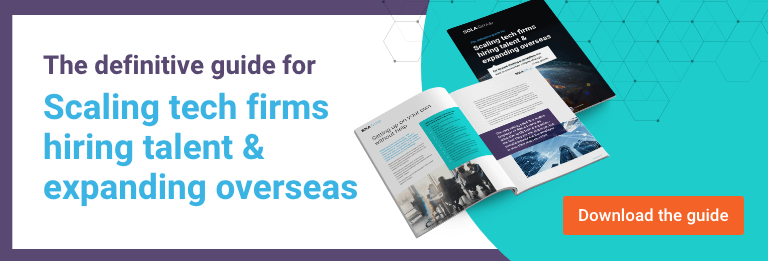Netflix was founded after Reed Hastings was charged a $40 late fee by Blockbuster. Ronald Regan was supposed to star in Casablanca. It's illegal in the US to shout "fire" in a crowded theatre.
Myths exist about almost everything out there, and these factoids are generally innocuous. However, misconceptions about how to expand your business internationally could potentially lead to grave consequences. So debunking them is vital to ensure you expand smoothly—whatever your stage of the expansion journey.
Myth # 1 – There is a right time to expand internationally
It’s a common belief that there is a perfect moment to expand business overseas—either when you have completely saturated your home market or hit a magic number. In reality, there is no one moment. Instead, numerous factors could indicate you might be ready to expand internationally.
These include obvious factors such as having happy customers and success in your home market. Other indications include slowed growth in your national market or overseas markets showing interest in your service. However, it's always important to evaluate more personal considerations, such as whether you are excited about overseas expansion and if you have the corporate structure to balance local presence with international insight.
Myth # 2 – You need to open your own foreign entity
International expansion through setting up your own foreign entity is certainly one option. And doing so can afford you benefits, such as retaining complete control over your business. Suppose you have a comprehensive understanding of the business landscape into which you are expanding, a deep knowledge of the myriad compliance issues, and a network of connections with top talent. In that case, setting up your own entity is a good option.
However, this route is generally taken by behemoths like Google and Microsoft, who can dedicate all the resources necessary—and have the pockets to do so. Companies that haven't quite reached that level of market domination might consider partnering with a local provider with expertise in areas such as employment law, private law, and executive search. A partnership can allow an expert firm to take care of all the unknowns—reducing risk—and allowing you to concentrate on expansion, which is complicated enough.
Partnerships will always be temporary; the end goal should always be for you to reach the point where you have grown sufficiently to open your own entity—with the complete knowledge to do so.
Myth # 3 – Foreign expansion requires a huge initial investment
Of course, foreign expansion doesn't come cheap. But, related to the previous point, there are several ways of choosing the right strategy to expand internationally. Expanding by opening your own entity will potentially come with a hefty price tag, so taking advantage of a local partner could be a more cost-effective solution.
Instead of having to work it all out by yourself, your investment will pay for expert knowledge of the local landscape and guaranteed compliance. This reduces the risk of getting things wrong and having to pay a fine or ending up in a court of law. Partnering with a local firm will also put you in control of your spending and enable you to scale operations at the right pace.
And when you are finally ready to make a complete investment and open your own foreign entity, you will have the infrastructure and ecosystem to do so.
Myth # 4 – You can hire a team abroad using LinkedIn
Your headquarters are in the US, but you are hiring in Europe. No problem; you can do everything online and use LinkedIn in today's remote world. But your company needs to hire the best talent to drive sales and growth abroad. Top talent is likely to be already employed rather than looking for a job. Using LinkedIn will reduce your search to active candidates who may not have the skillset you are looking for.
Perhaps you could do what many of your competitors do: delegate the task to several local recruitment firms and see who comes up with the best candidates. While this might seem intuitively reasonable, the method has perverse incentives—recruitment companies find candidates quickly rather than the best candidates. And the longer it takes, the less effort they put into finding a candidate at all.
Identifying a local expert firm with vast experience in your industry and an intricate understanding of the local employment market is more likely to yield positive results. If you engage them on a retained basis, they are incentivised to find you the candidate with the perfect skill set who shares the same values.
Myth # 5 – Employment law is the same abroad as it is in the US
This is one of the biggest myths that can have serious consequences. US employment law is very different from the law in most EMEA countries, particularly in Europe. The principal difference is known as "at will employment". According to Thompson Reuters Practical Law, at will employment is:
“Employment that is not guaranteed and can be terminated at any time by either the employee or employer for any reason or no reason, with or without notice or cause, provided that it is not for an unlawful reason (for example, unlawful discrimination or retaliation).”
However, this legal concept does not exist in Europe, where legal systems tend to favour the employee rather than the employer—the opposite of the situation in the US. It is vital that companies have a very firm grasp of the local employment law if they want to avoid being subjected to foreign lawsuits.
Myth # 6 – It's easy to support an overseas team from the US head office
It's forgivable to think that with all the HR tech out there, supporting employees on every corner of the globe is simply a case of logging into a platform. But something that tech has so far been able to overcome is time zones. A company based on the Pacific Coast is a whole working day behind its employees in London or Berlin, and a day's lag will likely result in a subpar employee experience. This is especially true for new employees who may need immediate support.
However, even if time zones are not an issue, a lack of understanding of local culture and needs will always be a significant risk when expanding a business internationally. Trying to support employees without this knowledge is like flying blind—you won’t know there is a problem until it is too late. Disgruntled employees can lead to high churn rates and damage your company’s reputation.
Myth # 7 – You don’t need to worry about compliance
Perhaps this myth should be that compliance is too expensive and not that important, rather than that you don't have to worry about it. But, as the aphorism goes, if you think compliance is expensive, try noncompliance.
You are unlikely to be well informed about local compliance issues, including legal compliance, hiring practices, pension schemes, payroll regulations, mandatory benefits packages, taxes, social security, and data protection.
However, you need to be aware of all these issues. In the past few years, Amazon, Meta, WhatsApp, and Google have all been slapped with some eyewatering fines for compliance breaches. But the fine does not have to be astronomical to be a fatal blow to your business and to euthanise all hopes of dominating a foreign market. Doing things correctly is the best way to save money in the long run.
Myth # 8 – They’ll understand us; we speak English
Believing that your employees and target market will understand you just because their native language is English is a mistake. Tone, register, level of formality, and culture all play a role in communication—over and above the words we use. Communication between people from the US and Ireland, for example, can go horribly wrong if people's expectations are misaligned. Making this mistake can deter customers and alienate employees.
And if the country you are expanding into does not speak English as a native language, there are even more opportunities for things to go astray. Even the best systems and ideas at home can be misunderstood, or they may not be aligned with the target culture abroad.
The importance of understanding and respecting languages and cultures can be a determining factor in the success of your business. You might have thought of all the “serious” issues, but ignoring this one could be more damaging than a lawsuit.
Myth # 9 – Your IP will be as safe as it is at home
You certainly make sure that your IP is protected at home. The employment contracts your employees sign mean that you have immediate ownership of the IP they create and ensure confidentiality, which is a critical protection for your company. You also have an uninterrupted chain of trust and possession of your IP, flowing directly from your company to your employees and back again.
You are protected at home, so your employment contracts will protect you abroad, right? Wrong.
The reason for this is that copyright laws are a bundle of rights that are different in each country. Some countries have stronger copyright laws, and others have weaker ones. There are sometimes crossovers, but no two countries match perfectly, which means international expansion can leave a company’s IP dangerously vulnerable. Vulnerable unless an expert international IP engineer is managing it.
Myth # 10 – EoR/PEO solutions are perfect for your international expansion
You may be one of the many companies looking for an expansion solution as you do not yet want to open your own entity. Professional Employer Organisation (PEO) and Employer of Record (EoR) solutions have been around for many years, but they have become popular choices for expanding companies over the past five years.
EoR and PEOs do offer a basic level of structure and guidance. They can help companies reduce their time to market and assist with some basic assured HR functions and local compliance. However, for SaaS companies, there are many pitfalls of using EoR and PEOs.
These employment solutions leave companies dangerously open by not offering true protection from legal proceedings. SaaS firms' IP is not fully protected, and PEO/EoRs offer no continuation of employment for employees when you want to open your own entity—something that will negatively affect the chances of recruiting and retaining top talent.
Conclusion
Myths are stories; some might have an element of truth to them, while others are entirely fictional. When finding the best way to expand internationally, companies must search for the truth that lies at the bottom of the myth—success depends on it.


